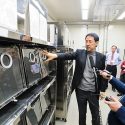Flu transmission studies could resume soon
Yoshihiro Kawaoka, a professor of pathobiological sciences in the School of Veterinary Medicine, talks with a group of media representatives during a tour of the Influenza Research Institute on Feb. 13.
Photo: Bryce Richter
After a voluntary hiatus of more than a year, avian influenza transmission studies may soon resume at UW–Madison’s Influenza Research Institute (IRI) as the National Institutes of Heath (NIH) last week issued a new framework for vetting such experiments.
The research, conducted by Yoshihiro Kawaoka of the UW–Madison School of Veterinary Medicine’s pathobiological sciences department, is aimed at understanding the genetic mutations needed for a flu virus strain known as H5N1 to become transmissible in mammals.
The wild virus only transmits readily in birds. However, 500 or so cases of human infection have been documented and more than half have been fatal, making H5N1 a worrisome strain for public health officials. The Wisconsin studies will help hone both surveillance and preparedness, should the wild virus acquire the mutations necessary for it to pass easily in mammals, including humans.
The new vetting policy put in place by NIH is aimed at balancing the risks and benefits of the research. Before any new studies begin, they must undergo an added layer of review, in addition to existing biosafety protocols, and meet seven criteria based on scientific potential, significance for human health and the absence of alternative research strategies.
Tags: biosciences, federal relations, influenza, research



